 Petzlover
Petzlover Chippiparai is originated from India but Parson Russell Terrier is originated from United Kingdom. Chippiparai may grow 27 cm / 11 inches higher than Parson Russell Terrier. Chippiparai may weigh 12 kg / 27 pounds more than Parson Russell Terrier. Both Chippiparai and Parson Russell Terrier has same life span. Both Chippiparai and Parson Russell Terrier has almost same litter size. Chippiparai requires Low Maintenance. But Parson Russell Terrier requires Moderate Maintenance
Chippiparai is originated from India but Parson Russell Terrier is originated from United Kingdom. Chippiparai may grow 27 cm / 11 inches higher than Parson Russell Terrier. Chippiparai may weigh 12 kg / 27 pounds more than Parson Russell Terrier. Both Chippiparai and Parson Russell Terrier has same life span. Both Chippiparai and Parson Russell Terrier has almost same litter size. Chippiparai requires Low Maintenance. But Parson Russell Terrier requires Moderate Maintenance
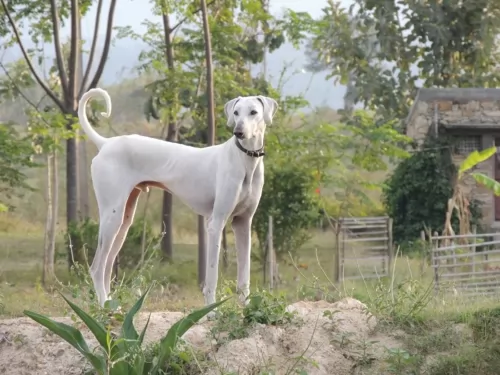 The Chippiparai is a working dog found in India and until recently there has been little interest in the purity of any breed, but rather only an emphasis on the abilities of the dog. They are only beginning to research the origin and history of their native dogs such as the Chippiparai. Not much is known about the origin of the breed except that it is found almost exclusively in Tamil Nadu and Keraia in the southern part of the subcontinent of India. Other than this there is much speculation about the breed’s origin but very little-known facts. It is indeed an ancient breed; however, its origin could be thousands of years ago or simply hundreds of years ago.
The Chippiparai is a working dog found in India and until recently there has been little interest in the purity of any breed, but rather only an emphasis on the abilities of the dog. They are only beginning to research the origin and history of their native dogs such as the Chippiparai. Not much is known about the origin of the breed except that it is found almost exclusively in Tamil Nadu and Keraia in the southern part of the subcontinent of India. Other than this there is much speculation about the breed’s origin but very little-known facts. It is indeed an ancient breed; however, its origin could be thousands of years ago or simply hundreds of years ago.
• Perhaps it is a descendant of the Saluki as it resembles this breed quite a bit. It has been believed for some time that the Saluki is the original sighthound and the source of all sighthound breeds. The Saluki was very popular in the Middle East, especially in Persia and Arabia from which it could easily have spread to India. It would then have been shared from Northern India to Southern India where the Chippiparai is found.
• Perhaps the Chippiparai is a descendent of sighthounds from Central Asia and Afghanistan – the Tazi, Taigan, Hortaya Borsaya or the Afghan Hound. This part of Central Asia had more trade, influence and contact with the Indian subcontinent early in their history than with any other region. The Chippiparai is considered by some to be more like these sighthounds than like the Saluki and the interaction between these regions has a much longer history than the Middle East and India.
• It is also speculated that the Chippiparai might have been developed completely and uniquely from the local street and working dogs. With the civilization of India being one of the oldest in the world, it is considered a possibility that the Chippiparai is the descendent of the Harappan hunting dogs that probably were developed by the Indus Valley or Harappa roiling class.
Wherever the Chippiparai came from, they were the exclusive property of the wealthy and ruling castes. These upper castes were the only ones that could legally hunt with dogs or afford to feed one. The royal classes of Tiruneivell, Thanjavur, and Madurai all fed the popularity of the breed among the upper castes. They were coursing dogs used to chase down the prey once it was sighted. The Chippiparai are incredibly fast runners and would catch almost any prey and either hold it or kill it for their hunter. The Chippiparai, when not hunting, had to be chained so they would not chase any small animal that they saw. This confinement also added to the purity of the breed as random breeding was prevented.
The southern part of the Indian subcontinent is extremely hot with routine temperatures over 100’. The Chippiparai was developed to withstand these extreme temperatures and is more heat tolerant than most any other breed. They also need very little food and are resistant to the many parasites and diseases found in southern India.
Harboring the belief that Indian dogs were not as good as European ones, the occupying countries of Portugal, France, and Britain, had no interest in the Chippiparai, again leaving the breed to develop naturally on their own with little or no interbreeding. They also received no formal recognition because Indian culture only valued the dog for its working abilities. There was no Indian Kennel Club until 1956.
The Chippiparai is now very rarely and only found in the area of its birth. Many believe the breed is in danger of becoming extinct and even though it is now registered with Indian Kennel Clubs it is not often shown in their dog shows. Lovers of the breed are now attempting to get Indians to recognize that the Chippiparai is a great companion animal and attempting to save the breed.
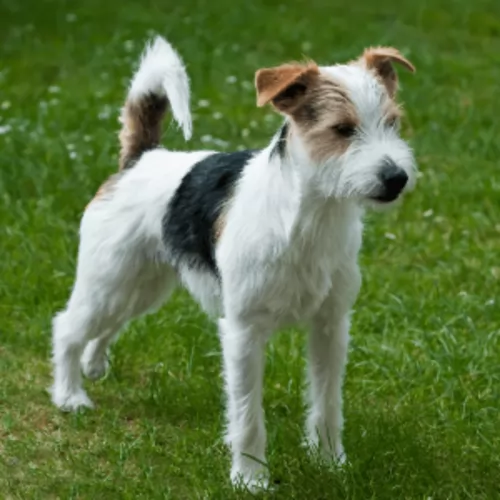 The Parson Russell Terrier hails from England and is a small to medium sized dog dating back to the 18th century. It is believed that Reverend John ‘Jack’ Russell was the developer of this dog. The Parson has always been involved with England’s sport of foxhunting.
The Parson Russell Terrier hails from England and is a small to medium sized dog dating back to the 18th century. It is believed that Reverend John ‘Jack’ Russell was the developer of this dog. The Parson has always been involved with England’s sport of foxhunting.
They’re spritely and quick and have been able to keep up on a hunt and take on a fox in its lair. The dog was first recognized in 1990 in the United Kingdom as the Parson Jack Russell Terrier and in America in 1997.
All the top kennel clubs recognize this dog as the Parson Jack Russell Terrier.
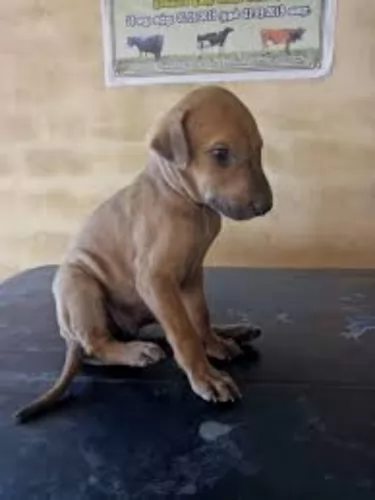 The Chippiparai is a typical sighthound although their size and appearance will vary more than that of registered purebred sighthounds. Typically, they will have a long, domed head with small erect ears and dark eyes. Their muzzle will be as deep and wide as the skull but longer. Their legs are straight and long, their chest is roached back and deep, giving them, an appearance very similar to a greyhound or other sighthound.
The Chippiparai is a typical sighthound although their size and appearance will vary more than that of registered purebred sighthounds. Typically, they will have a long, domed head with small erect ears and dark eyes. Their muzzle will be as deep and wide as the skull but longer. Their legs are straight and long, their chest is roached back and deep, giving them, an appearance very similar to a greyhound or other sighthound.
They have a long curly tail, and their coat can vary greatly in color. They are medium sized, and their coat is short, shiny and close. He is very slender and sleek, which along with his long legs gives him that incredible speed. They are thin with visible ribs.
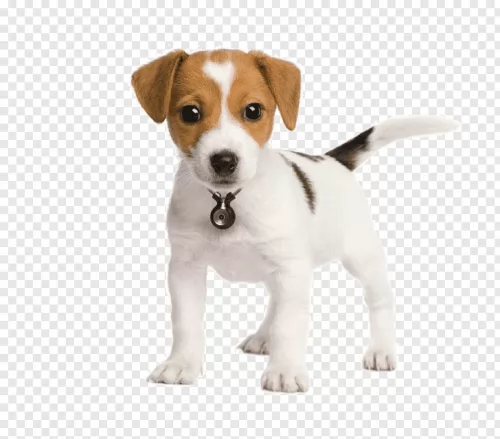 The Parson Jack Russell is essentially a white dog with black and tan or orange-fawn patches. He can be tri-colored too. The coat is either smooth, rough or broken.
The Parson Jack Russell is essentially a white dog with black and tan or orange-fawn patches. He can be tri-colored too. The coat is either smooth, rough or broken.
He stands at between 33–36cm tall at the withers and weighs between 5 and 8kg. Unlike the Jack Russell, the Parson Russell Terrier has longer legs. He has some longer hair on the head, legs and body. The ears are floppy wit the tip pointed forward. The tail has always been docked but when left long it it held high, slightly curving over the back.
Feisty, brave, cheeky and alert, the Parson Russell Terrier is an energetic dog who gets on well with children as he knows that this is essentially where his games come from.
He is bold and clever and you’ll be able to have him trained and socialized without any trouble. These little dogs are full of life and they are protective of their humans and their property, making excellent watchdogs.
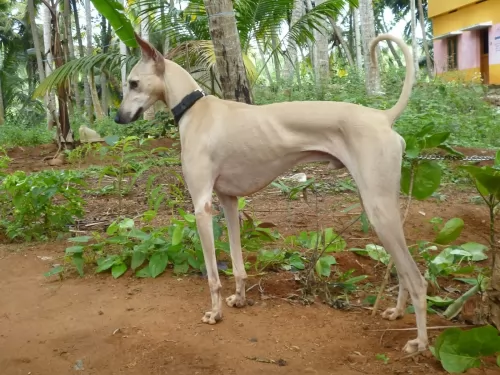 The Chippiparai is a loving, gentle family dog if well socialized, well trained and well exercised. They are very intelligent and need human companionship. Once they are living with a human family, they are very protective of that family. They are for the most part peaceful and quiet dogs. They are loyal and loving but they are not overly affectionate. Cuddlers they are not, and they do not like to play rough with children.
The Chippiparai is a loving, gentle family dog if well socialized, well trained and well exercised. They are very intelligent and need human companionship. Once they are living with a human family, they are very protective of that family. They are for the most part peaceful and quiet dogs. They are loyal and loving but they are not overly affectionate. Cuddlers they are not, and they do not like to play rough with children.
Accepting and loving within the family, the Chippiparai are equally hesitant and shy around strangers. They can be suspicious, but they are not aggressive. They are just very aloof with strangers, yet they hardly ever bark.
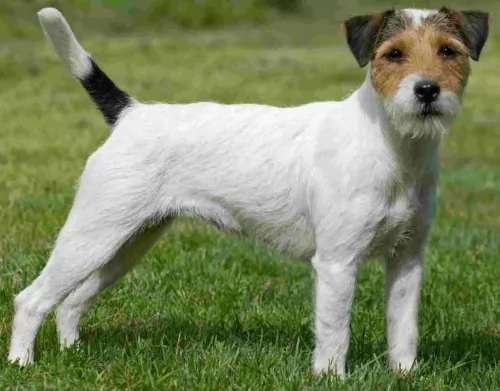 In general the Parson is a friendly,loving dog, fairly small but packed full of feisty personality.
In general the Parson is a friendly,loving dog, fairly small but packed full of feisty personality.
They make excellent pets for the entire family. He is an intelligent dog, but typical of most terriers he can be stubborn, but this can easily be fixed with training and socialization. With good care, he’ll make you a wonderful little pet and companion.
 There are no clinical studies regarding the health and health history of the Chippiparai, so little is known about their long-term health. However, most who know the breed, believe it is an incredibly healthy one. They seem to have a lot less genetically transmitted health issues than other purebreds. Because of their isolation for centuries in India, they have developed immunities and resistance to most parasites and diseases other dog suffer from.
There are no clinical studies regarding the health and health history of the Chippiparai, so little is known about their long-term health. However, most who know the breed, believe it is an incredibly healthy one. They seem to have a lot less genetically transmitted health issues than other purebreds. Because of their isolation for centuries in India, they have developed immunities and resistance to most parasites and diseases other dog suffer from.
Because of this you should look for the types of issues that occur in dogs of this size and build. Have them tested by the Canine Eye Registration Foundation and the Orthopedic Foundation for Animals.
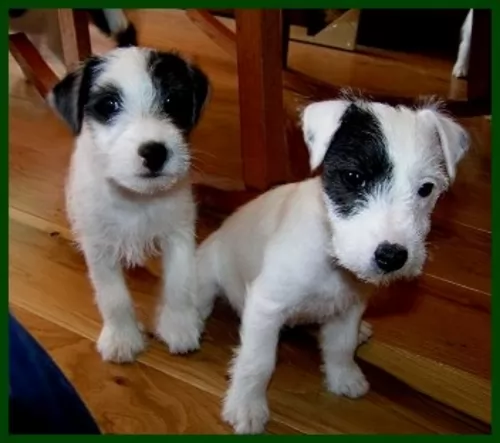 Your Parson Jack Russell can live to be between 12 and 15 years but nonetheless he does have some breed-related health issues to watch for.
Your Parson Jack Russell can live to be between 12 and 15 years but nonetheless he does have some breed-related health issues to watch for.
Eye conditions which can affect this dog include primary lens luxation,cataracts, corneal dystrophy and progressive retinal atrophy. With cataracts the lens of the eye develops a cloudy look resulting in poorer vision and sometimes blindness. Cataract surgery is available for dogs.
Your Parson Jack Russel should be lean and muscular and always full of energy. Avoid feeding him unhealthy treats which can lead to obesity and other health problems.
All kinds of parasites such as ticks, fleas and worms can invade your dog’s body. Roundworms, hookworms and tapeworms can cause havoc with their health and some of these parasites can even be transmitted to humans. It’s why it is important to get your puppy to the vet to be de-wormed and to get his first injections.
A liver disorder known as portosystemic shunt can mean that some of the blood supply doesn’t get to the liver and it doesn’t function properly. This will mean the liver can’t remove toxins from the bloodstream effectively.
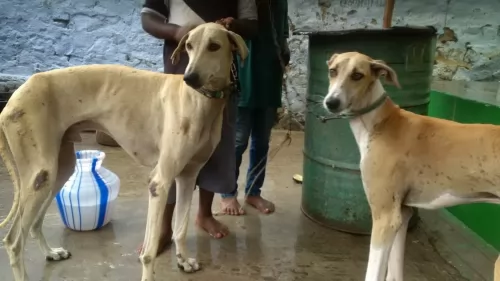 Do not overfeed your Chippiparai. Feed twice a day and no more than a total of 2.5 cups of high quality dry food.
Do not overfeed your Chippiparai. Feed twice a day and no more than a total of 2.5 cups of high quality dry food.
As mentioned previously the Chippiparai seems to have no genetic diseases or issues and very few acquired ones. However, he is sensitive to anesthesia and some foods. He is intolerant to cold weather and has a hard time with his pads on hard surfaces. Some Chippiparai might experience some of the ailments other breeds like them experience.
Both Elbow and hip are possible. This can cause arthritis and lameness. This occurs when the bone does not fit well into the joint.
This can cause lameness as well. The kneecaps slide over the knee instead of staying in place.
This is a hunting dog and he will want to hunt. They are incredibly fast and need the opportunity to run. Brisk walks will not be enough for this dog. He is very energetic. They will chase any small animals. It is not recommended that you have small pets even small dogs or cats with a Chippiparai. Having been bred for centuries to hunt, they are not likely to respond to any commands if they are off lease and chasing prey. Do not allow them to be off leash unless in a fenced area, and that fence needs to be 8 feet tall as they can easily jump a seven-foot fence. Try they at coursing, agility, fly ball and frisbee competitions.
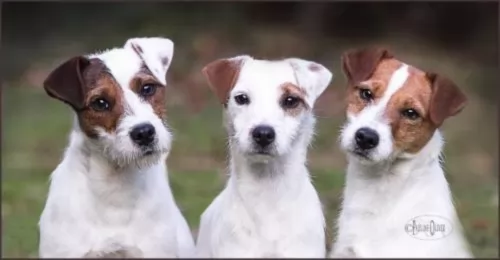 The Parson Russell Terrier has different coat types – the smooth and rough and both will require regular brushing. Rough coats will require plucking or clipping to avoid matting.
The Parson Russell Terrier has different coat types – the smooth and rough and both will require regular brushing. Rough coats will require plucking or clipping to avoid matting.
Check his eyes and ears regularly. Look inside his ears for excess wax and dirt which could lead to an ear infection. His nails should also be trimmed.
The best thing you can do for your Parson Russell Terrier if you don’t want your pet producing puppies is to have it spayed or neutered. Spaying for females or neutering for males decreases the likelihood of certain types of cancers too so it can be beneficial.
Diet is hugely important for a Parson Russell Terrier and the food you decide for him can impact his health. Many time those ‘treats’ you feed your pet do nothing more but give him a stomach ache.
It's tempting to pop chocolates, popcorn, nuts and ice cream into your pets mouth when he is so adorable but in the long run it is shortening his life. All he basically requires and needs is a simple, consistent diet of the top commercially manufactured foods mixed with some tasty home made food from time to time.
Boiled chicken, brown rice and vegetables such as sweet potatoes, carrots and spinach will do your pet wonders. Ensure he always has fresh, cool water available to him.